25 Points: You Private Person
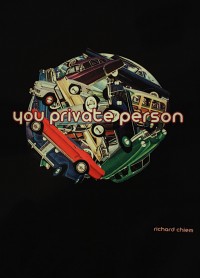 You Private Person
You Private Person
by Richard Chiem
Scrambler Books, 2012
139 pages / $12.00 buy from Scrambler Books
1. I appreciated what I imagined was the time spent in deciding the titles for the individual stories. They seem to be an art form in it of itself and are often cast aside with boring, one word placeholders in other collections. But these seem like really good tweets, or prompts for possible flash fiction.
2. I was intrigued before even opening the book. Between the nice cover art by Mark Leidner and the trio of blurbs on the back cover that force you to not only start reading but, when you’re done, place the book face down so as to show off the insanely nice and potent words of Dennis Cooper, Kate Zambreno, and Blake Butler.
3. It’s a small book, under 150 pages, but the actual size of it and layout of the pages w/r/t to font, spacing, etc, make it feel much more hefty and somehow more important.
4. This is the first thing I read from Scrambler Books. I have certain small presses that I’m comfortable with purchasing pretty much anything and everything they release. If this book is any clue to Scrambler’s future intentions than I plan on adding them to my queue, to the detriment of my bank account.
5. I’ve never read Chiem before this. I went back and found some of his stories online. They didn’t disappoint. I love it when an author is able to bridge the difficult gap between lone stories in online journals and a fully formed collection in print.
6. I’m jealous. I’ll admit it. Chiem is born a year after me and he’s a hell of a writer. He’s put together a collection of stories that I aspire to replicate in my own way. This book has a maturity behind it that hides the fact that this is his first published book.
7. “The first fiction is your name,” Eileen Myles. Seems like a perfect quote to open the book. It put me in a subdued and contemplative mindset before the first story.
8. There is something in this book for everyone. As much as I hate when I read the previous statement in a review for this book, it’s true. Short fiction, some prose poetry, fragments of stories, linked narratives.
9. You’ll definitely feel a little better about the future of the short story after reading this collection. Chiem is a young writer who has a stranglehold on his craft, who has finely tuned his pen to hear the whispers of our society, the forgotten people, the discarded images are given a second home.
10. The opening paragraph of the book is perfect. It combines his greatest gifts as a writer: his pitch perfect sense of how to put together a sentence and his ability to allow himself the freedom to wander with his thoughts while still maintaining the discipline to reign it all back in and bring the reader to a larger point, usually profound yet understated. “Cigarettes can levitate you and the bare weight you have very bored in your head and you have never known you were unhappy until the feeling leaves you like imagined geese from hills eager for migration. Birds are so fun to imagine. This all comes from years of wanting to know how to fly standing out on balconies pretending sex is the name same as flight because surely geese can feel in the air like I do when her eyes go crossed when bedrooms soften after foreplay when language works much like animal speech. Only by repeating each other’s names. I do believe all birds are named Chirp.” READ MORE >
April 18th, 2013 / 4:07 pm
web version POP SERIAL 4 is launching today
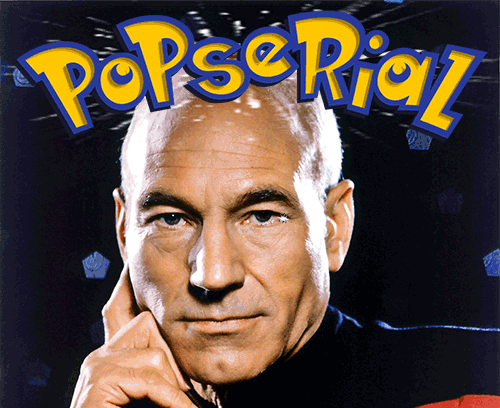

first up, Ben Brooks “future president.” more to follow. who looks at htmlgiant every day still? it was called a professional looking blog in the la review of book recently. idk, is it profesh? i recently described myself to someone with one word: unprofessional. idk what thats about. it is 2013. if anyone is reading this but not commenting and lives in brooklyn hmu, i am looking to drink and have a good time. hi
25 Points: The Prodigal
 The Prodigal
The Prodigal
by Alexander J. Allison
Civil Coping Mechanisms, 2013
194 pages/ $12 buy from Amazon
1.
2. Allison’s novel “The Prodigal” explores the nature of a man born with a silver spoon, his relationship to his parents, to school, to his best friend David and most importantly, to Poker. The protagonist’s name is Martin and you will follow him through a series physical, financial and existential crises in this portrait/cringe-theatre/road-trip/gambling novel.
3. In conjunction with reading this novel, I started playing online poker.
4. This is a very helpful companion to The Prodigal http://en.wikipedia.org/wiki/Glossary_of_poker_terms
5. Three structural features of the novel include:
a) varied text size. At times a word will or series of words will appear in large, irregular font to point out a particular emotion or event. I have seen Ben Brooks do this. Is it a British thing?
b) italicized asides like “Sad shadows saddows”. These are humorous plays on words or ideas hat break the text with an unpunctuated breath.
c) Flashback chapters which operate similar to Lost episodes, connective tissues are formed showing why Martin is fucked.
6. To start, I downloaded an App simply called “Poker” onto my Ipad. I started with 10,000 dollars. What endears one about the game is just how fucking simple it all seems at first. Each individual game consists of a few small choices. There is lying involved as well as the puffing-up of chests. This is a very inhuman way to play poker, it is fast-paced, difficult to read people, and deeply anti-social. There is no ‘chat’ feature in “Poker” and most of my opponents are faceless guests. My first day into “Poker” ended with a 45,000 dollar profit.
Diary note: This game is a joke. People who play it are morons/addicts.
Three days later, I would be swishing cuticle treads around in my mouth praying to god before the river of a shitty flop. I was hounded with insecurities and sleeplessness. Poker was no longer a joke but an insipid nightmare I continued to return to. I’d entered into the realm of pay-to-play online poker and my budget had been exhausted thrice over.
Diary note: I’ll do it for the novel.
7. Martin in a casino:
“This microcosm has its own language. It’s a living lexicon. The game’s language exists to keep some fools out and trap even bigger fools in You’ll have heard of donkeys and fish, but what of the rockets? What of the fishhooks and gay waiters? What of the suck and resuck, the gutshots and wraps and double bellybusters? What space is there for a beat jackpot? What is there left to be said of tilt? Who is durrrr to you? What’s an isildur1? How would you respond to OMGClayAiken? What is life before you’ve sharkscoped Spirit Rock, nanonoko, moorman1? This language is the soul of poker. Cards are but a blunt instrument. Cards are the messy, unpredictable side note to the sport. It is cards, however which force the drama of life.
Internally, Martin is humming the Pink Panther theme-tune. This makes him feel sneaky.”
8. On 7 alone you should read this book.
9. The book says much of what many books say about being 20 is like: the depressing vacancy one achieves when the last drop of innocence leaves you. But the metaphor of poker intermingled with this prodigal/rich kid presents the reader with the quandary of: how do I root for this guy? The path I took was not so much to root, but to sit down and enter Martin and ride from one catastrophe to another. The balance of sincerity and humor comes off sardonic, but the smiles feel earned and cringes unavoidable.
10. donk bet
1 A bet made by a donk, i.e. one that is generally considered weak or to demonstrate inexperience or lack of understanding of strategy.
2 A bet made in early position by a player who didn’t take initiative in the previous betting round. It was named because this move is often considered indicative of a weak player (since it is more often reasonable to expect a continuation bet). READ MORE >
April 16th, 2013 / 2:33 pm
25 Points: Here and Now: Letters (2008-2011)
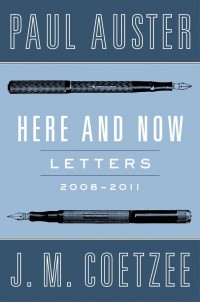 Here and Now: Letters 2008-2011
Here and Now: Letters 2008-2011
by Paul Auster and J.M. Coetzee
Viking, 2013
248 pages / $27.95 buy from Amazon
1. As the title suggests, this book documents the correspondence between Asturias Prize winner Paul Auster and Nobel Prize winner J.M. Coetzee from 2008-2011.
2. According to my calculations there are 79 letters, though some letters include emails explaining a fax machine is broken or low on ink.
3. It is not revealed if either titan of world literature had to dial a 9 before faxing.
4. There is no editor’s note, introduction, epilogue or index. Peculiar for a book of letters. There are footnotes but only sometimes: a biography of Kafka is footnoted while Pierre Clastres’ Chronicle of the Guayaki Indians is not.
5. 11 letters were exchanged in 2008, 30 in 2009, 25 in 2010 and 13 in 2011. The 2008 and 2011 exchanges are high-spirited, covering topics ranging from why men enjoy watching sports to the film director William Wyler.
6. On the 24th letter they perfect their flow: “Thank you for yesterday’s fax. I feel that we have finally hit upon a workable system. A slow letter across the seas from America to Australia and then a quick, electronic transmission of paper from a room in a house in Adelaide to a room in a house in Brooklyn.”
7. I would’ve liked to have been a fly on the whiteboard when Viking Press gave the green light to the title. I could’ve squashed myself.
8. Coetzee is why I wanted to read this book. I thought I’d never read a book by Auster. Halfway through I realized I have read several of his books, years ago, but I still don’t remember reading them. Is not reading a book and not remembering reading a book the same thing? Scrolling for Auster I found James Wood’s mean-spirited article from 2009. Whenever James Wood decides someone is a bad writer they deserve a closer look.
9. “The emboldened critic,” Coetzee says in letter 42, “becomes like the child lobbing pebbles at the gorilla in the zoo, knowing he is protected by the bars.” Auster on James Wood: “I mustn’t complain, least of all about a man whose name suggests that one day he will be eaten by termites.”
10. This book made me miss my grandfathers. READ MORE >
April 11th, 2013 / 12:00 pm
25 Points: Billy Lynn’s Long Halftime Walk
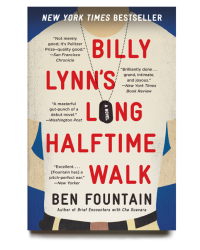 Billy Lynn’s Long Halftime Walk
Billy Lynn’s Long Halftime Walk
by Ben Fountain
Ecco, 2012
320 pages / $14.99 buy from Amazon
1. Fall, 2002. I’m in New Castle, Delaware, dining alone — at Hooters. I hadn’t gone to eat chicken wings at an ironic remove; I was just lonely. I hadn’t finished college, and I was working at a tiny weekly newspaper in a tiny state where I knew no one. It must have been a Saturday; there was a college football game on. I was reading The Atlantic and only intermittently glancing up at the televisions. I’m not sure when I noticed the four fatigue-clad soldiers at a table behind me, nor do I know where my sudden patriotic impulse came from, but I asked my waitress to get them a pitcher of whatever they were drinking, put it on my tab, and not to tell them why they were getting it.
2. The charms of four fit, uniformed men turned out to be more persuasive than those of an overweight sportswriter with wing sauce in his whiskers. Before I was able to pay my check and get the hell out of Hooters, the waitress had fingered me to the table of soldiers. The sergeant (I have no idea if he was a sergeant; he could have been a major corporal or lieutentant admiral for all I know) was tapping me on the shoulder: “Sir? Did you buy this?” He was holding the pitcher of beer. I admitted that I had, and he offered a hearty thanks and a firm handshake, then insisted that I come over to greet the other men.
3. Here’s what I was thinking on the short walk to the soldiers’ table: “Don’t say ‘Thank you for your service.’ Don’t say ‘Thank you for your service.’ Don’t say ‘Thank you for your service.’”
4. You’ve already guessed what I said.
5. In my truck, George Costanza “jerk-store” style, I imagined the speech I’d have given otherwise: “I don’t know what I think about us going to Iraq, but I hope you guys stay safe. … I don’t agree with the war, but I support you guys.”
6. This incident — the peak of my involvement in more than 10 years of American wars; my single “support the troops” moment — has been back in my head ever since I finished Billy Lynn’s Long Halftime Walk, Ben Fountain’s National Book Award finalist and National Book Critics Circle winner. The novel and the memory fire many of the same synapses, engage the same particularly American themes: sex, death, football, and their various intersections.
7. A few months after 9/11, a friend from my rural Missouri high school and I were on the phone together, trying like everyone else to make sense of things. We were on the same page up until he said “I’m sure you were like me. Ready to sign up and go over there.” I mumbled something in agreement, but this had not occurred to me.
8. Neither of us did, of course. Go over there, I mean. We each had options. I was failing out of college, but I had options.
9. Billy Lynn has no options. We meet the 19-year-old PFC on Thanksgiving Day, 2004. He’s in the back of a limo, taking the edge off after a group of patriotic well-wishers having just “trampolined right down the middle of his hangover.”
10. This young boy from central Texas and his squadmates in Bravo Company are about to conclude a two-week, whirlwind “victory tour” with a cameo appearance in the halftime show of the Dallas Cowboys’ Thanksgiving game against the Chicago Bears. Bravo Company (which, it turns out, is not the group’s proper military designation but has been simplified for media digestibility). READ MORE >
April 9th, 2013 / 6:20 pm
25 Points: Antwerp
 Antwerp
Antwerp
by Roberto Bolaño
New Directions, 2012
96 pages / $9.95 buy from Amazon
1. I wouldn’t say that this is the big bang of Bolaño’s fictional universe. I would say that it’s a baby fictional universe growing in the black hole of another baby fictional universe growing in the black hole of another baby fictional universe growing in the black hole.
2. This book has a lot of quotations without identified speakers. Without particularized mouths. As in how do we know who’s speaking or what it means to claim possession of a speech act. As in how do we know what’s Tupac and what’s a hologram of Tupac.
3. It’s like if I were to say to my computer, “say banana” and it said “banana,” and if this went on for a while with me saying words and my computer repeating them, until eventually I wrote down only my computer’s part of the exchange and made a novella out of it. Except that instead of saying banana I would say things like
“ The evening light dismantles our sense of the wind.”
4. Machines that move you. People in cars and trains, racing across highways and fields, going nowhere fast, towards a multiplicity of voided horizons.
5. Once I had a dream that was also a film I was directing where the main character kept experiencing acute disassociation from her body every time she got on an airplane or into a car, etc, and in the dream I (as the director and actress of the film) kept feeling the words “I’m not here.” I wish I could describe the torture of that feeling besides just calling it singular and unforgettable. Similar to the feeling of watching the movie Inception in the middle seat of an airplane flying over the ocean. Also, the feeling of reading this book, in certain moments.
6. There’s someone writing a story, the one you’re reading, and as the words are being written they’re simultaneously being picked up and examined by the characters in the story, or they’re splattering onto the car windshield of the man driving across the desert, who every few minutes catches himself looking down at his wrist despite the fact that he’s never worn a watch, not once in his life. i.e. “The word ‘teeth’ slid across the glass, many times.” Its pretty much how I feel about being human and having to die- like I have the vaguest awareness of myself as a decaying thing, but only enough to be a minor irritation to whomever(s) or whatever(s) may or may not have put me here.
7. One really great thing is how many of the short, one page “chapters” are actually scenes from the avant-garde porn film Bolaño wanted to make but never did. Or maybe he wanted someone else to read the book and do it for him. He even gave clues as to what he imagined the premiere would look like: a hunchback in the forest watching while someone ties a sheet to a pine tree with a thick piece of yellow cord and then says, smiling, “I’m going to show a film.”
8. This is one of those literary works that make me wish I’d studied quantum physics as a kid instead of making timelines.
9. At one point someone diagrams the changes in the affective landscape of a dream using straight-wavy-jagged line patterns and follows that with “nnnnnnnn” repeated, which is a really estranging onomatopoeia because I don’t seem to belong to the sound-world it’s referencing.
10. There’s a character who’s just called “the hunchback.” I’m not going to be corny and say that this was my favorite character in the book, except that I’m not sure there are any other characters. READ MORE >
April 4th, 2013 / 5:00 pm
ENFANT TERRIBLE GONE BAD: AN INTERVIEW WITH PRETEEN GALLERY’S GERARDO CONTRERAS
“[Our community is] one that constantly sabotages itself: the anticommunity of networked souls.” —John Kelsey, Next Level Spleen

There is no sentiment more omnipresent in the art world than that of dissatisfied skepticism. Today more than ever individuals exposed to the arts derive conclusions about the value of the work based on the context or network in which the art is presented.
The link provided on Preteen’s Twitter page describes Preteen Gallery as “a small contemporary art space in Mexico City.” In true “networked soul” fashion, I emailed Preteen, stating: “I would like to interview you: either ‘you,’ the actual person behind the feed, or ‘you’ as an online performer/entity.”
Gerardo Contreras, founder and director of Preteen, grew up in Ciudad Obregón and moved to Hermosillo to study architecture in his twenties. He founded Preteen in 2008 by transforming an unoccupied apartment space in Hermosillo he had under his possession. The name stems from its founder’s early memories of watching online pornography, in a time when there were no real restrictions on Internet content. In regards to his curatorial ideology, he cites Javier Peres’ Peres Projects and Maurizio Cattelan’s The Wrong Gallery as influences.
The workload Contreras has undertaken is certainly prohibitive of the severe drug habits his tweets imply. In a single month his schedule included opening Jaime Martinez’s Shyness is Nice Don’t Ask Me, curating I’m Too High to Deal with this Shit Right Now in Madrid, So Confused LOL in Belgrade and Derrida.pdf in Vienna.
Contreras convincingly performs the role of the curator as a force of nature—a nature that implies it allows the real-life connection that Kelsey fears will become extinct in our era of “hyperrelational decadence,” but a nature that also illustrates the unpredictability and fickleness that Kelsey expected.
It might appear that there are no limitations of political correctness in a conversation with Contreras, but that is certainly not the case. An endeavor to delve deeper into his process was cut short due to Contreras’s interpretation of pointed questions as indicative of my “Christian-American condescending gaze,” as he framed it, blatantly ignoring the fact that I am neither. Despite the honesty that characterizes his descriptions of his past drug experiences, hypothetical questions (ie. “Do you ever wish drugs weren’t important to you?”) offend him irrevocably.
Contreras employed a hyperconscious approach to respond to a request for further clarifications, resulting in his complete misinterpretation of the intended tone. In turn, he responded with a redundantly aggressive email that set the tone for our remaining interactions. Since I truly intended to learn as much as I could about his perspective and influences, I instantly apologized. My apology was genuine, and I once again reiterated my intention to construct his portrayal in utmost honesty. In theory, Contreras accepted this apology. In practice, the visceral responses he provided as clarifications indicated otherwise. The curator’s more-recent responses altered my stance towards the degree of the performative aspect of the Preteen Gallery tweets: both online entities thrive on belittling and disparaging others to accentuate their ‘superiority.’ READ MORE >
April 4th, 2013 / 11:03 am
25 Points: Mad Girl’s Love Song
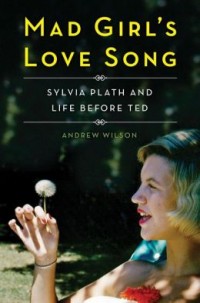 Mad Girl’s Love Song
Mad Girl’s Love Song
by Andrew Wilson
Scribner, 2013
369 pages / $30 buy from Amazon
1. After reading the Bell Jar and the biographical note in the back, the next piece of information about Sylvia Plath that I encountered was the only point of reference I had about her for a very long time. Alice Miller’s For Your Own Good features an essay called “Sylvia Plath: an Example of Forbidden Suffering,” in which Miller illustrates a scene of young Plath presenting to her mother and grandmother a pastel piece on which she has worked hard. The ebullience she demonstrates in showing off her achievement made a searing impression on me—I was not used to seeing female artists proud of their work; I was used to seeing them compromised and unfulfilled. The conclusion of the scene is equally powerful and so devastating, it remains my primary reference point regarding Plath as a depressed person: when her grandmother stood up, she smudged the pastel enough to ruin it. Plath’s flat affect, her inability to situate her disappointment where it belonged, has never not occurred to me when I’ve read about her, even though this scene does not recur with the canonical relish of, like, the St. Botolph’s Review launch party. By virtue of this scene’s inclusion in Andrew Wilson’s Mad Girl’s Love Song, I was swayed at first.
2. Plath’s writing is very important to me, and I love biographies where she is treated as the inexhaustible writer she was. As a subject, though, the way her work is so visceral, so loaded with the feelings that connect her to contemporary readers, that access overwhelming emotion, when she was remote, blank, totally affected: that I find riveting. Death notwithstanding, the more accessible her work, the less accessible she was. One cannot experience the closeness with her as a subject that one feels through her writing.
3. Although I bought and read the book because it’s about Plath, I am reluctant to use the biography as a means to discuss her because her work is more interesting than she is, so there’s that shame: why not talk about the work? In Wilson’s case, I do agree that the events of her young life are unfairly glossed over when she was so productive and disciplined so early, and for that I was excited to read Mad Girl’s Love Song.
4. The people in proximity to Plath aren’t ghosts here, either. Wilson talked to people who remembered her petulantly in some cases and fondly in others, and all vignettes get a greater sense of who they were than who she was, which makes for a livelier telling than what occurs from corralling facts from her archives—how real personalities generally unmoved by her achievements react to the young, raw person who remains animated in their pasts.
5. Her sexual voracity is emphasized as soon as possible, and much dwelled on are the rape fantasies she confessed to correspondent Eddie Cohen. The sole editorialization by the Wilson surrounding these incidents—which occur throughout the book—is: “We have to remember that Sylvia was a young woman overloaded with a huge store of sexual energy that she was not allowed to express…” This is pretty remarkable considering how Wilson handles other events.
6. Besides the unprecedentedly thorough examination of Plath’s childhood and Smith College years, the big news of this biography is how she demonstrated the tendency to self-harm in the immediate aftermath of her father’s death, and that self-harm manifested in the deliberately extreme and suicidal manner of attacks on the throat. This new fact, central to Mad Girl’s Love Song’s purpose, was the point at which I started to feel like I was reading Us Weekly not in terms of content but in terms of how I felt like, why am I reading this, I am so full of shame.
7. An aside: in Twin Peaks: Fire Walk With Me, Laura Palmer knows she’s about to die. Agent Cooper points out how, while she did not commit suicide, she did consent to and prepare for her murder. In her last days, she warned her best friend, Donna, not to wear her stuff: don’t fetishize me, she was saying, don’t make me into a symbol or a set of aspirations, don’t channel me as a transcendent measure to get free from your boring suburban life; I am a broken person and I am in so much pain. It’s an incredible privilege that the dead girl gets – the audience is not only used to her as a structuring absence, but they’ve also seen Donna access her sexual awakening by wearing Laura’s sunglasses. Mad Girl’s Love Song is the kind of book Donna would have written about Laura Palmer: endowing talismanic power to incidents and items in lieu of presenting the facts of her life and why she is worth discussion.
8. “Although I thought [Plath] might be awfully good, I was on the cusp a little on how she might fit in. Her behavior was almost a performance, which I found a bit of a problem. You might be there another day and find an entirely different personality.” – Gigi Marion, college department, Mademoiselle
9. Eddie Cohen chastised Plath for her complete inability to be spontaneous, and the roots, extremes, and repercussions of her constant performance are explored fully in Mad Girl’s Love Song. Mademoiselle‘s ambivalence about Plath provides a great launching pad for a vital paragraph on the magazine’s own artificiality. The way the magazine fully constructed the “New York” experience that the co-ed guest editors has for too long gotten off without comment, but it is so much a part of what powers the Bell Jar, to wit, the conclusion may justifiably be drawn, it made a serious impact on Plath. It’s one thing to put on a face and look the sweetest and the most congenial, it’s another to play along with the mass hallucination that high-rise parties with hired dates have any place in reality.
10. “It was a lunch designed for the girls to get to know one another a little better, and we were at that stage where we were watching one another very carefully, all of us groping to see what we should do, how we should behave. Very shortly after we were seated—at this nice table with a white table-cloth—a large bowl of caviar was served. The caviar was supposed to be for everyone on the table, but Sylvia reached out for it, pulled it in front of her, and began eating. She proceeded to eat the whole bowlful of caviar with a spoon. I remember thinking to myself ‘how rude’…” – Ann Burnside Love, guest merchandise coordinator READ MORE >
April 2nd, 2013 / 2:23 pm
25 Points: Gerald McClellan vs Nigel Benn
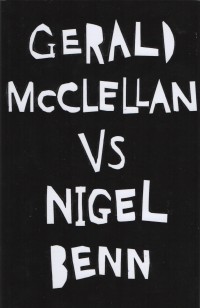 Gerald McClellan vs Nigel Benn
Gerald McClellan vs Nigel Benn
by Sam Pink
Wormblanket Press, 2013
$10.00 buy from Wormblanket Press
1. Who are these people. I picture Gerald McClellan in a ring with Nigel Benn but maybe they’re just labels on a whiskey pint, they’re on the shelf next to each other like “Hey, we made it,” and maybe they have. Shelf life for life.
2. Sam’s Chicago doesn’t require much “game” or at least if you’re pretty for a white boy it kind of seems like the junkies are all thinking like a bunch of teenage girls.
3. I felt the distinct possibility of having teenage girls want to/pretend to want to fuck me to be alluring but not in a sexual way. All those big eyes with mascara and vodka and older brothers smaller than me. Everything would ride on those brothers being smaller than me, though. They’ve got retractable batons. My little brother once had a friend named Erin that I wanted to like me because she was going to art school in France according to my mom.
4. I worked in a warehouse once. So did I. The people in Sam’s warehouse seem like chillers. I want to throw a jammer with these chillers, and then they do. Same thing about the feeling in “Nice Job”. I would have never said “Nice Job” to anyone driving a forklift. Thought about it though.
5. Limited death types/options on pursuing boxing as a future.
6. Every story has a choice. Listing choices is easy. Spending the night outside of your girlfriend’s apartment because you have no other choice, even if you think the rats are sweet, is a hard choice to make. The movements of Sam’s characters feel both arbitrary and necessary, but always made by one person alone.
7. No matter what, the homeless will always have more friends than you.
8. G’be k’n me is something I’d like to incorporate into my regular speech.
9. If my grandfather always said, “Hey, now who’s this little shithead?” I would be okay with it because my grandfather has Alzheimers. Mine are all dead.
10. Just went to the movies last night. Didn’t question why no one talked to me. Kind of want to move to Chicago. READ MORE >
March 28th, 2013 / 12:09 pm
25 Points: Dear Jenny, We Are All Find
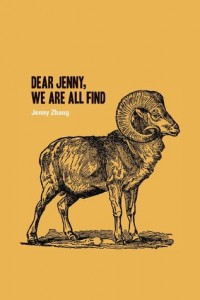 Dear Jenny, We Are All Find
Dear Jenny, We Are All Find
by Jenny Zhang
Octopus Books, 2012
116 pages / $12.00 buy from Octopus Books or SPD
1. MOTHERLANDS
“keats was married to vladimir nabakov
they gave birth to my aunt who spoke no Spanish
and colonized all of western Europe
and that’s why michael’s dad ate my left toe leaving me
crippppled”
(“Lifestyle: I Think I Had a Nice Life and Then I Was Doing Weird Things Like Talking About Having a Bad Life”)
2. I started following Jenny Zhang on her blog Fashion For Writers, back in 2007 or something when I made my living selling vintage clothing to places like France for too much shipping and attempting be less insular by people taking photos of what they were wearing in other places. She was in Iowa wearing coats that made me feel like I could survive winter in Ohio and Montreal, where I was planning to move next.
3. Broke and preoccupied with trying to survive winter by books and digging my car out with hot water to get to the thrift store the morning of 50cent tag day, my Canadian neighbor didn’t own a shovel. “Why doesn’t your city know how to buy salt for their streets?!” I stayed mute and poured water and felt mute that winter, representing a city I had exclusively lived in and identified with and clutched at matryoshka dolls from antique malls lining my shelves and wanting to chuck one at my car for living somewhere that made it requisite.
4. I think I owned, like, 10 vintage coats at one point. I got pretty disgusted with myself that winter.
5. A couple weeks back, Heather Christle reposted the caddis fly larvae works of Hubert DuPrat in Cabinet Magazine and posited the idea that poems are analogous to sheaths, constructed from details of our shifting environments. I didn’t set out to write a companion essay review, but 25 bullet points are hard to extract from concepts this immaculately presented as external, when poetry is thought of as a “internal” and “emotional” when it communicates a lot like clothing. Here’s the traditional review reaction I had if I felt differently:
6. “Dear Jenny makes me feel so many more creepyvoyeurfangirl things, like ‘yikes oh yikes I’m exceedingly aware of how we’re reading ancestrally and seeing the sheaths in their past and future relevant form reading anything, into love poems to things and people and continents dead for centuries!!!!!’” Genuinely felt, but I sound twelve.
7. “Family members are resurrected for a second and then blown back to poppy fields before you can say ‘twat.’ Zhang’s incurably dynastic and reads prosaically in its turns and forms, and they’re bratty and fleshly corporeal in each syntactical bowel movement.” Blurb suited for an
Amazon review: discarding.
8. “We are all find she says
bonjour well because
well she is Chinese and anyway
we don’t use R’s”
(“My Mother Leaves Me a Message Where She Pronounces All Romance Languages in a Deep Voice”)
The semiotic problem of “Asian-American” is the book’s seppuku, which I mean gesturing with misappropriation like Zhang does in so many poems. The inherent difficulty of language in relation to identity as American is as blatant as asking “what are you?” to your face, language can answer that anything but in part. If the audiences of the speaker’s voice heard I was from Ohio, they’d think definitely lived near cows and should have a twangy Gummo accent. How many times did I cringe at Harmony Korine’s decision to film in Nashville? Each and every time I moved.
9. It would be better to use a dung beetle analogy instead of the silk casings Octopus Books gives to its larvae. Dear Jenny’s concerns and permutations of scatology is made legitimately profound, or find its profundity is pointed at without making the profane pornographic. Example:
10. “. . .I’ve been coursing through the finite rivers
the smudge of black on yr fingertips and I’m yrs
ya cunt, I’m yrs, yr the cuntiest
cunt I’ve ever cunted” (“Key Phrase”) READ MORE >
March 26th, 2013 / 12:09 pm
